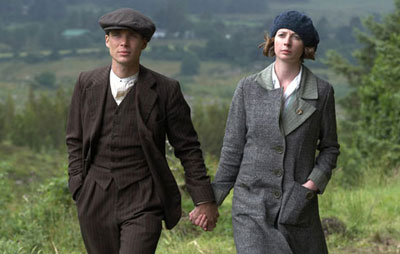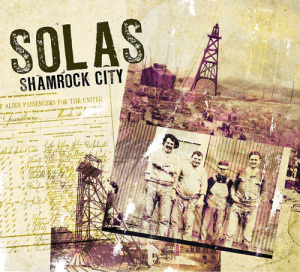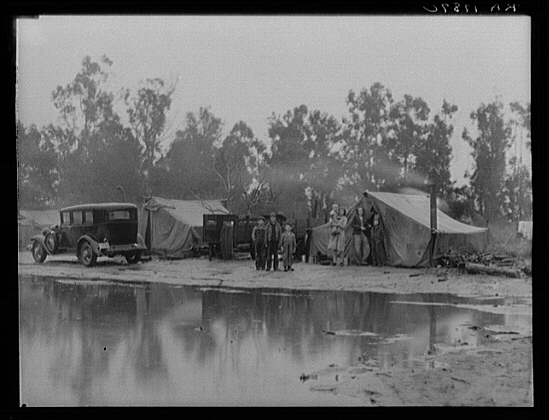Autore Solas
The Wind That Shakes the Barley

La canzone è un perfetto connubio tra canto d'amore e canto di protesta (rebel song) tratto dalla poesia omonima pubblicata in "Ballads, Romances and Song" da Robert Dwyer Joyce nel 1861 e abbinata alla melodia "The old love and the new love". Nel 1872 Robert Dwyer è emigrato a Boston, dove ristampa le sue poesie irlandesi con alcuni nuovi testi in "Ballads of Irish Chivalry".
"L'orzo che si muove nel vento" è diventato il simbolo dei ribelli irlandesi del 1798, pare che sulle fosse comuni dove venivano seppelliti i "croppy boys", crescesse l'orzo, germogliato dalle razioni di cibo che si portavano in tasca; così lo spirito del nazionalismo irlandese non poteva essere distrutto e tornava a rinasce. Non sta a indicare quindi solo una stagione, l'estate, è anche l'immagine che rievoca nel protagonista il dolore: il momento della scelta tra l'amore per la famiglia e la patria, la morte dell'amata... (continua)
"L'orzo che si muove nel vento" è diventato il simbolo dei ribelli irlandesi del 1798, pare che sulle fosse comuni dove venivano seppelliti i "croppy boys", crescesse l'orzo, germogliato dalle razioni di cibo che si portavano in tasca; così lo spirito del nazionalismo irlandese non poteva essere distrutto e tornava a rinasce. Non sta a indicare quindi solo una stagione, l'estate, è anche l'immagine che rievoca nel protagonista il dolore: il momento della scelta tra l'amore per la famiglia e la patria, la morte dell'amata... (continua)
I sat within the valley green,
(continua)
(continua)
inviata da Cattia Salto 26/3/2018 - 16:16
Percorsi:
I conflitti Irlandesi
Felix the Soldier
anonimo

Questa canzone era già inserita a commento di Mrs. McGrath, con la quale condivide il soggetto, il soldato va in guerra e torna senza le gambe, ma le assonanze finiscono qui. Questa risale alla guerra franco-indiana (1754-1763), ovvero al fronte Nordamericano della guerra dei sette anni tra Inglesi e Francesi, quella in cui è ambientato "L'Ultimo dei Mohicani"
Non si trovano molte registrazioni del brano, eccezion fatta per una recente versione interpretata dal supergruppo irlandese Ushers Island: Andy Irvine (Planxty), Dónal Lunny (Planxty, Bothy Band, Moving Hearts), Paddy Glackin (tra i fondatori della Bothy Band, prima di lasciare il posto a Tommy Peoples), Mick McGoldrick (inglese di Manchester, di genitori irlandesi, membro degli scozzesi Capercaillie, dei Flook e poi di Lùnasa) e John Doyle (ex Solas)
Alan Lomax says in The Folk Songs of North America: (in the English Language) (Amazon... (continua)
Non si trovano molte registrazioni del brano, eccezion fatta per una recente versione interpretata dal supergruppo irlandese Ushers Island: Andy Irvine (Planxty), Dónal Lunny (Planxty, Bothy Band, Moving Hearts), Paddy Glackin (tra i fondatori della Bothy Band, prima di lasciare il posto a Tommy Peoples), Mick McGoldrick (inglese di Manchester, di genitori irlandesi, membro degli scozzesi Capercaillie, dei Flook e poi di Lùnasa) e John Doyle (ex Solas)
Alan Lomax says in The Folk Songs of North America: (in the English Language) (Amazon... (continua)
They took away my brogues
(continua)
(continua)
inviata da dq82 26/6/2017 - 15:00
Far Amerikay

2013
Shamrock City
In 1910, Solas band leader Seamus Egan's great-great uncle Michael Conway left his home in Co. Mayo, Ireland and boarded a ship for America. He was headed to the copper mines and boxing rings of Butte, Montana, aka Shamrock City (named so for the influx of Irish immigrants). Six years later, at the age of 25 and in a cloud of mystery, Michael was dead at the hands of local police.
Shamrock City as seen through the eyes of Michael, tells the story of the thousands of young men and women who left behind their homes and families for "the Richest Hill on Earth". It reveals their spirit, tenacity and humor, but also the hardships they faced: discrimination, corruption within the mining companies, an unknown and unforgiving land, a system that valued the few over the many. One hundred years later, it's their story, but the struggles of the working class and immigrants are... (continua)
Shamrock City
In 1910, Solas band leader Seamus Egan's great-great uncle Michael Conway left his home in Co. Mayo, Ireland and boarded a ship for America. He was headed to the copper mines and boxing rings of Butte, Montana, aka Shamrock City (named so for the influx of Irish immigrants). Six years later, at the age of 25 and in a cloud of mystery, Michael was dead at the hands of local police.
Shamrock City as seen through the eyes of Michael, tells the story of the thousands of young men and women who left behind their homes and families for "the Richest Hill on Earth". It reveals their spirit, tenacity and humor, but also the hardships they faced: discrimination, corruption within the mining companies, an unknown and unforgiving land, a system that valued the few over the many. One hundred years later, it's their story, but the struggles of the working class and immigrants are... (continua)
I asked what he was thinking but he hadn’t much to say
(continua)
(continua)
inviata da DoNQuijote82 21/9/2013 - 17:33
Tell God and the Devil

2013
Shamrock City
Shamrock City
In 1910, Solas band leader Seamus Egan's great-great uncle Michael Conway left his home in Co. Mayo, Ireland and boarded a ship for America. He was headed to the copper mines and boxing rings of Butte, Montana, aka Shamrock City (named so for the influx of Irish immigrants). Six years later, at the age of 25 and in a cloud of mystery, Michael was dead at the hands of local police.
Shamrock City as seen through the eyes of Michael, tells the story of the thousands of young men and women who left behind their homes and families for "the Richest Hill on Earth". It reveals their spirit, tenacity and humor, but also the hardships they faced: discrimination, corruption within the mining companies, an unknown and unforgiving land, a system that valued the few over the many. One hundred years later, it's their story, but the struggles of the working class and immigrants are the same. Shamrock City is for those then and now that believe in a better life, and are willing to risk it all for a chance at something more.
Shamrock City as seen through the eyes of Michael, tells the story of the thousands of young men and women who left behind their homes and families for "the Richest Hill on Earth". It reveals their spirit, tenacity and humor, but also the hardships they faced: discrimination, corruption within the mining companies, an unknown and unforgiving land, a system that valued the few over the many. One hundred years later, it's their story, but the struggles of the working class and immigrants are the same. Shamrock City is for those then and now that believe in a better life, and are willing to risk it all for a chance at something more.
Seven years a miner, a mine for seven more
(continua)
(continua)
inviata da DonQuijote82 15/8/2013 - 10:56
Pastures of Plenty

The Asch Recordings Vol. 1 (1944)
Describing the travails and dignity of migrant workers in North America, it is evocative of the world described in John Steinbeck's The Grapes of Wrath. The tune is based on the ballad "Pretty Polly," a traditional English-language folk song from the British Isles that was also well known in the Appalachian region of North America.
Recorded by Pete Seeger, Harry Belafonte, Bob Dylan, Tom Paxton, Jesse Colin Young, Peter Tevis, Peter, Paul and Mary, Dave Van Ronk, Ramblin' Jack Elliot, Flatt and Scruggs, Will Geer, Kingston Trio, Country Joe McDonald, Odetta, The Alarm, Solas, Alison Krauss & Union Station, Paul Kelly, Lila Downs, Cisco Houston, Karl Denver, Scott H. Biram, The Travellers, Judy Collins, Jefferson Starship
Il pezzo fu arrangiato da Ennio Morricone e cantato da Peter Tevis per il film "Per un pugno di dollari" di Sergio Leone. (Ma Si veda qui questa osservazione di Cristian Veronesi)
Describing the travails and dignity of migrant workers in North America, it is evocative of the world described in John Steinbeck's The Grapes of Wrath. The tune is based on the ballad "Pretty Polly," a traditional English-language folk song from the British Isles that was also well known in the Appalachian region of North America.
Recorded by Pete Seeger, Harry Belafonte, Bob Dylan, Tom Paxton, Jesse Colin Young, Peter Tevis, Peter, Paul and Mary, Dave Van Ronk, Ramblin' Jack Elliot, Flatt and Scruggs, Will Geer, Kingston Trio, Country Joe McDonald, Odetta, The Alarm, Solas, Alison Krauss & Union Station, Paul Kelly, Lila Downs, Cisco Houston, Karl Denver, Scott H. Biram, The Travellers, Judy Collins, Jefferson Starship
Il pezzo fu arrangiato da Ennio Morricone e cantato da Peter Tevis per il film "Per un pugno di dollari" di Sergio Leone. (Ma Si veda qui questa osservazione di Cristian Veronesi)
It's a mighty hard row that my poor hands have hoed
(continua)
(continua)
1/9/2011 - 21:45
×
![]()

Shamrock City
In 1910, Solas band leader Seamus Egan's great-great uncle Michael Conway left his home in Co. Mayo, Ireland and boarded a ship for America. He was headed to the copper mines and boxing rings of Butte, Montana, aka Shamrock City (named so for the influx of Irish immigrants). Six years later, at the age of 25 and in a cloud of mystery, Michael was dead at the hands of local police.
Shamrock City as seen through the eyes of Michael, tells the story of the thousands of young men and women who left behind their homes and families for "the Richest Hill on Earth". It reveals their spirit, tenacity and humor, but also the hardships they faced: discrimination, corruption within the mining companies, an unknown and unforgiving land, a system that valued the few over the many. One hundred years later, it's their story, but the struggles of the working class and immigrants are... (continua)